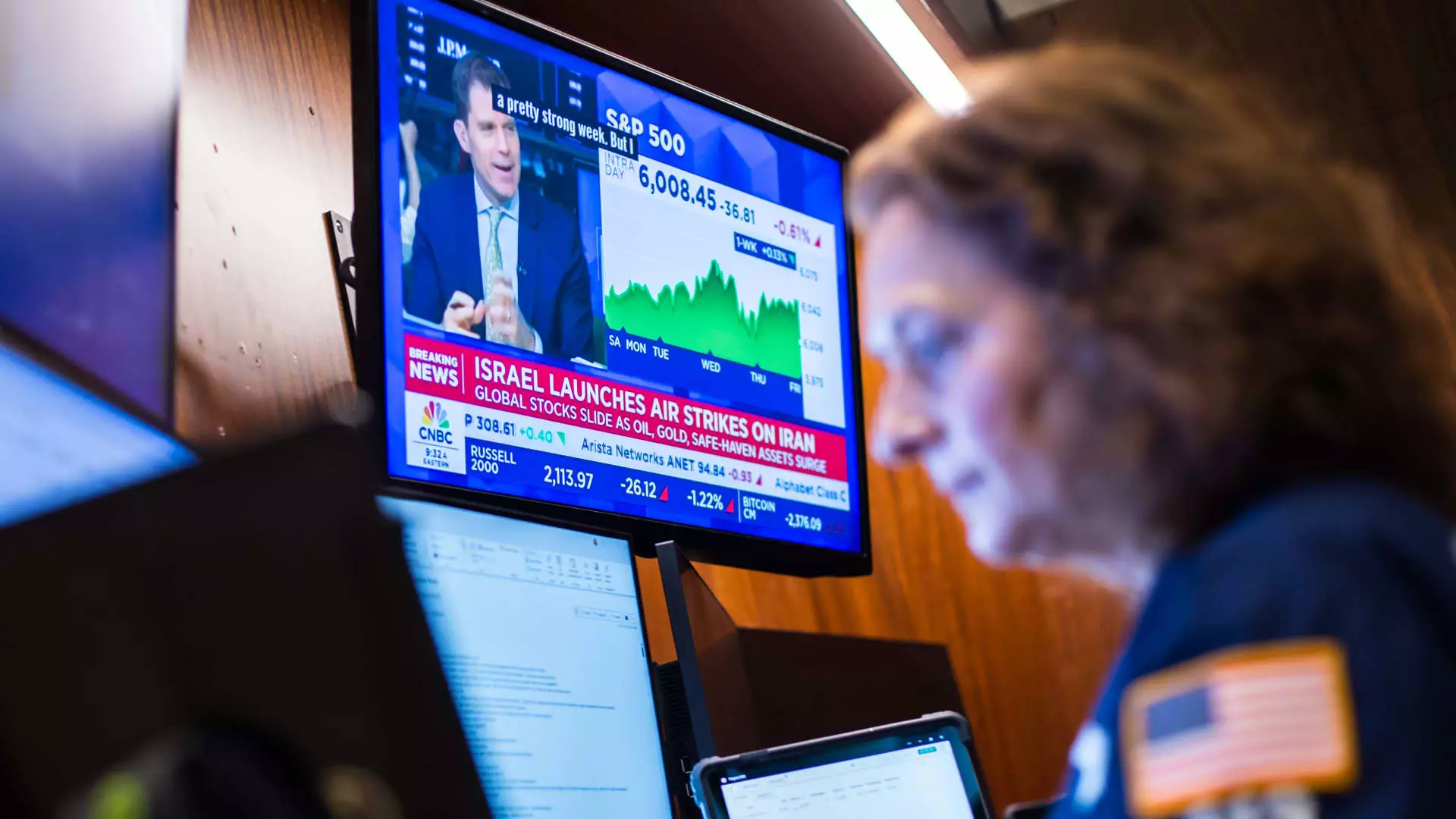What began as a seemingly uneventful week quickly spiraled into chaos on Friday with Israel’s aggressive action against Iranian nuclear facilities. This incident ignited a storm across financial markets, rattling investors and airlifting geopolitical anxieties to new heights. The immediate repercussions were glaringly evident as U.S. stock indices plummeted—the S&P 500 and Nasdaq Composite dropped by 1.13% and 1.3%, respectively. The sudden volatility was palpable, sending shockwaves across the trading floor.
Oil prices surged as geopolitical tensions escalated; Brent crude and West Texas Intermediate experienced boosts of approximately 7% and 7.5%, respectively. Gold, traditionally the haven for anxious investors, spiked to a two-month zenith, reinforcing its status as a safe refuge amidst uncertainty. Prior to the strike, momentum in the markets showed promise, setting the stage for a positive week. However, the spiraling events left the S&P 500 and Nasdaq trailing, down 0.4% and 0.6% for the week, effectively quashing back-to-back weekly winning streaks—an unsettling reminder of the delicate balance financial markets maintain amid global strife.
Adding to the complex geopolitical web, whispers of a U.S.-China trade-deal framework regarding rare-earth minerals emerged, promising a flicker of hope in a notoriously tumultuous relationship. Nevertheless, with uncertainty so palpable, one cannot help but question the extent to which this fragile truce might hold against the backdrop of rising global tensions.
Economic Indicators: A Silver Lining?
While the markets grappled with geopolitical upheaval, investors received refreshing news on the inflation front earlier in the week. Both the consumer price index and the producer price index revealed lower-than-expected inflation rates—a glimmer of optimism in an otherwise turbulent financial environment. These developments could offer relief to consumers, enhancing their purchasing power despite signs of a cooling labor market.
Yet, a sobering reality remains. Though inflation appears to be subsiding and unemployment rates hold steady, the underlying issues may not be as straightforward as they seem. The job market is showing weakness, as evidenced by unchanged weekly jobless claims lingering at multi-year highs. One can’t help but feel the uneasy balance of an economy that, while displaying signs of resilience, seems to be teetering on the edge of an impending downturn. The mixed economic signals only serve to compound uncertainty, leaving investors in a state of suspended vigilance.
AI Anticipation: A Double-Edged Sword
The week was equally electrifying within the realm of generative artificial intelligence. Companies are racing to outpace one another in this indomitable sector, with the outcomes decidedly unpredictable. Apple, during its highly-anticipated Worldwide Developer Conference, attempted to fan the flames of interest in AI advancements. Yet, the event felt underwhelming; stakeholders were left craving more substantial updates.
In stark contrast, Meta Platforms ignited excitement this week by disclosing a significant investment in Scale AI, announcing their intention to develop a “superintelligence” division aimed at achieving artificial general intelligence. This fervor for dominance in AI illustrates the potential for groundbreaking innovation, albeit against a backdrop of ethical concerns and existential dread surrounding the technology’s implications.
Nvidia’s CEO, Jensen Huang, provided insight into the company’s prospects at the GTC event, emphasizing the urgent need for expanded compute capacity to support skyrocketing demand—not just from market players but also from sovereign entities. Europe, he claimed, stands on the brink of a monumental uptick in its computing capabilities, set to expand tenfold in just two years. During such growth, however, comes the challenge of managing ethical considerations in AI’s implementation, something too often overlooked in the race for technological superiority.
As traditional competitors move to compete against the titan Nvidia, companies like Oracle and Advanced Micro Devices made headlines. Oracle, buoyed by better-than-expected quarterly results, surged in stock price despite broad market declines. Advanced Micro Devices, otherwise known as AMD, unveiled plans for a new AI server chip, aiming to carve out a space in a competitive field—landing OpenAI, the trailblazer behind ChatGPT, as a new customer. However, with such promises for future advancements, there’s an undercurrent of trepidation as we tread deeper into the realms of AI-powered technologies, leading us to question the sustainability of such exponential growth.
The intricate interplay of geopolitics, economic indicators, and AI advancements has transformed the landscape of financial markets into a battlefield rife with uncertainty. These themes define not just the week, but perhaps an era that demands careful attention to the consequences of human actions on a global scale. The question remains how we, as stakeholders in an interconnected world, will respond to these unfolding dramas.

